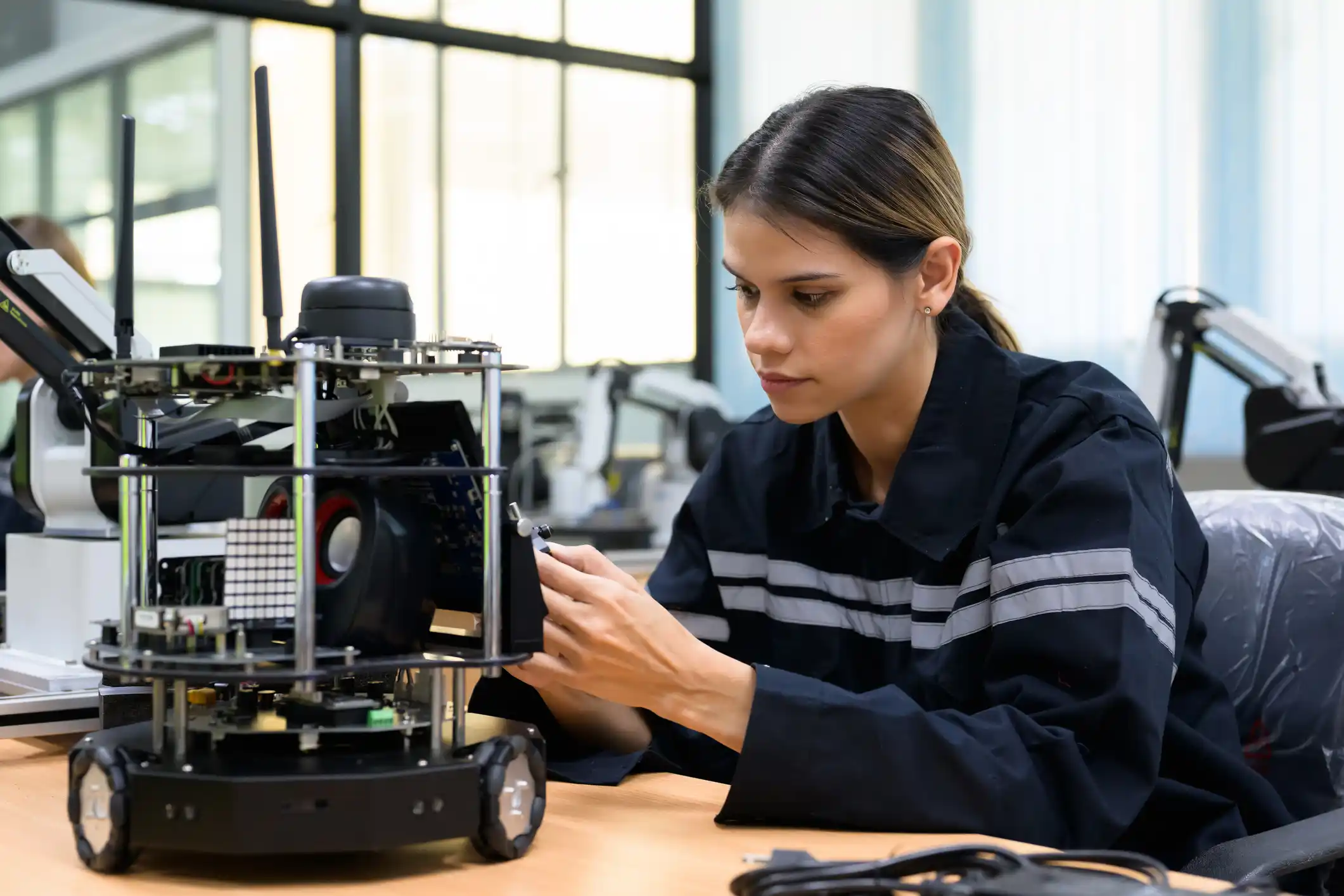
Coming together to take action to tackle engineering and manufacturing skills gaps
Date
11/04/2024
Category
Policy News , News
A blog post by Dame Judith Hackitt DBE FREng, Chair of the Enginuity Board
We cannot know exactly what future engineering and manufacturing jobs will look like, but we can be very sure they will be different from today’s. Technology has already had a huge impact on systems and processes in the sector, and the pace of change is set to increase rapidly.
Engineering and manufacturing together employ over 10 million people. UK manufacturing alone contributes £224bn GVA* to the economy each year.
The skills challenges faced by companies of all sizes are well known, but it is the urgent need to support the current workforce in developing the skills they will need for the future alongside ensuring a sustainable pipeline of new talent with the skills and desire to work in this nationally important sector, that has led Enginuity to publish its Skills Action Plan for the Engineering and Manufacturing Sector – A Manifesto for Change. We’ve set out five key priorities and a plan for addressing them. We’ve also affirmed Enginuity’s commitment to playing a leading role in delivering this plan, as the charity dedicated to finding new ways to close skills gaps in UK engineering and manufacturing.

────────
1. Upskilling and reskilling
Upskilling and reskilling the existing workforce is a key challenge facing industries within engineering and manufacturing.
People are a valuable resource, and considerable investment has gone into the training these valuable people have already had. But in a world of exciting technological change, it is vital that we constantly upskill and reskill workers to match the pace of that change and keep them in our organisations.
We need to understand and quantify future skills requirements, support the modularisation of qualifications and learning, and equip our workforce with skills that can be transferred between industries and sub-industries to support the progression and mobility of labour.
We must work together to make qualifications and learning more flexible, instil a common core curriculum based on key transferable skills, and reform the funding system to enable this.
Enginuity wants to work with governments, agencies, employers, trade associations, professional engineering institutions, and other stakeholders to help identify the key skills that should sit at the heart of all post-16 learning to support parity of esteem, transferability of skills, progression, and labour market resilience.
2. Attracting people to engineering and manufacturing
Industries within engineering and manufacturing must continue to attract new talent of all ages to maintain the workforce needed to be competitive and sustainable.
We need to talk differently about engineering and manufacturing, promoting not just jobs but careers, showing how important it is in delivering benefits to society and the economy, and we need to demonstrate that we welcome talent from diverse backgrounds.
We need to ensure transparent and accessible career pathways for all who wish to enter industries within engineering and manufacturing – including those whose geographical location or social background might previously have felt like a barrier. We believe in the power of apprenticeships as a route into the sector and we need to work hard to attract increased numbers to follow this route.
It’s vitally important that the industry collectively promotes engineering and manufacturing as a whole in addition to the opportunities within its diverse industries. Enginuity will continue to act as the sector connector, bringing stakeholders together to ensure that campaign messaging is consistent, clear, and complementary.
3. Flexible and responsive qualification and learning systems
It is essential that qualifications and standards are up-to-date and transferable between nations/regions and industries, and that we capture and pass on the knowledge and skills of the existing workforce to new workers through mentoring programmes.
Training and learning should also make the best use of modern technology to ensure that there is a sustainable and far-reaching network of provision at all levels, and which meets the needs of employers of all sizes. Funding needs to be commensurate with the scale of the challenge.
Enginuity will share comprehensive, up-to-date research so that training and learning decision-makers better understand the technical skills of the future, to ensure that qualifications and programmes are relevant, sustainable, well-designed, and effectively delivered.
4. A robust and cohesive evidence base
Policymakers and sector stakeholders need sound evidence on which to make their decisions on how to address recruitment and skills challenges.
We will collaborate with employers and policymakers across the UK to create a single skills observatory for our engineering and manufacturing sector and the industries within them that will receive comprehensive destination data including achievement rates on apprenticeships, technical and vocational education, degrees, and job and further learning outcomes.
5. Funding systems
For us to succeed in our national endeavour in engineering and manufacturing, we need to ensure the funding system is transparent and as simple as possible so that employers can understand what funding is available for early career training, as well as upskilling and reskilling their existing workforce.
We must recognise that further and higher education requires additional funding both for purchasing capital equipment and in order to attract inspirational trainers with up-to-date skills.
Enginuity is keen to work collaboratively with employers and national and regional bodies to optimise the use of the Apprenticeship Levy in England and all other post-16 funding.
Pledge your support────────
We all share a passion for creating a growing economy where modern engineering and manufacturing are playing a big and important part. We want to work with the UK government, along with devolved governments and authorities, to act quickly to close the skills gaps that threaten to undermine that exciting future for UK engineering and manufacturing. We can be a leading global player in engineering and manufacturing, but we need to act in unison to address the skills challenges.
Enginuity’s in-depth knowledge of the sector tells us that we need to:
- Make qualifications and learning more flexible with a focus on key transferable skills,
- Incentivise recruitment in priority industries with skills shortages,
- Ensure that funding for technical and vocational education, standards, and qualifications is commensurate with the critical need to upskill and reskill the engineering and manufacturing workforce,
- Establish a skills observatory using data and AI to analyse cross-sector and sector-specific needs,
- Refine the Apprenticeship Levy in England and make funding systems more transparent for engineering and manufacturing employers across the UK.
This is not a shopping list of things for Government to do. All those involved in the engineering and manufacturing sector; whether they are Further Education and Higher Education institutions, training providers, agencies, employers, trade associations, professional engineering institutions, or other stakeholders; must work together.
We hope you share our passion and recognise the priorities outlined in our Skills Action Plan for the Engineering and Manufacturing Sector. We would love to get your feedback, so please tell us your views and feel free to share this with your networks.
I have been closely involved with engineering and manufacturing my whole career, and as Chair of the Board for Enginuity, I’m passionate about creating a high-performance skills system that will help the sector grow, promote economic success, and support social mobility.
Let’s work together to make the UK’s engineering and manufacturing sector the very best that it can be.
*Source: Make UK
We urge UK manufacturing employers and policymakers to pledge their support and help our industry meet the skills challenges of the future.
Pledge your supportMore news



